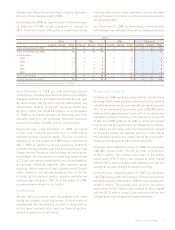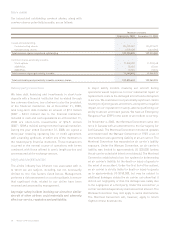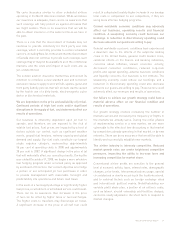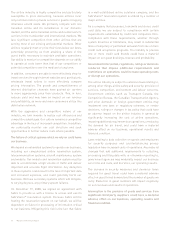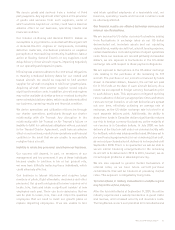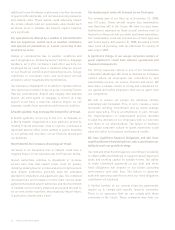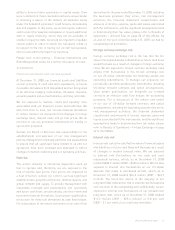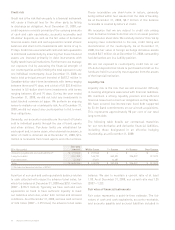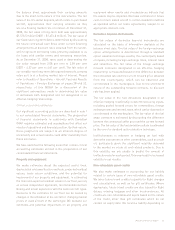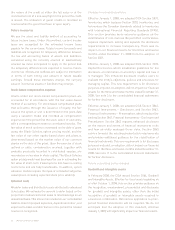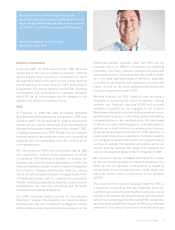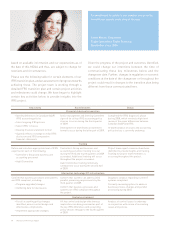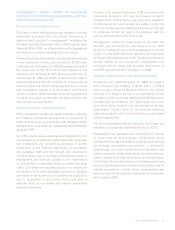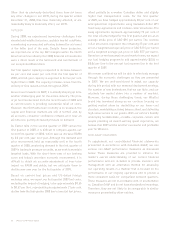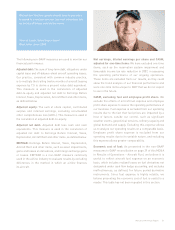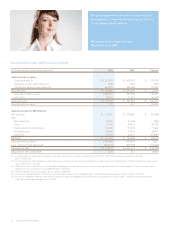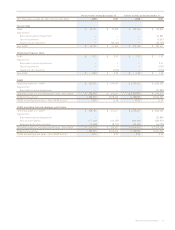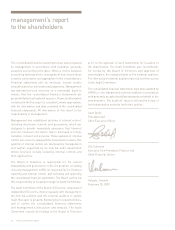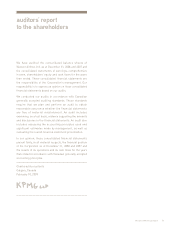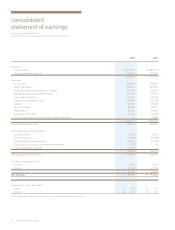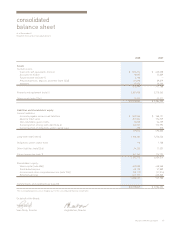Westjet 2008 Annual Report Download - page 51
Download and view the complete annual report
Please find page 51 of the 2008 Westjet annual report below. You can navigate through the pages in the report by either clicking on the pages listed below, or by using the keyword search tool below to find specific information within the annual report.
WestJet 2008 Annual Report 47
Business combinations
In January 2009, the CICA issued Section 1582, Business
Combinations. This section is effective January 1, 2011 and
applies prospectively to business combinations for which
the acquisition date is on or after our fi rst annual reporting
period beginning on or after January 1, 2011. Early adoption
is permitted. This section replaces Section 1581, Business
Combinations and harmonizes the Canadian standards
with IFRS. We do not anticipate that the adoption of this
standard will impact our fi nancial results.
IFRS
On February 13, 2008, the CICA Accounting Standards
Board (AcSB) confi rmed that the changeover to IFRS from
Canadian GAAP will be required for publicly accountable
enterprises for interim and annual fi nancial statements
effective for fi scal years beginning on or after January 1, 2011,
including comparatives for 2010. The objective is to improve
fi nancial reporting by having one single set of accounting
standards that are comparable with other entities on an
international basis.
We commenced our IFRS conversion project during 2008
and established a formal project governance structure,
including an IFRS Steering Committee, to monitor the
progress and critical decisions in the transition to IFRS. The
Steering Committee consists of senior levels of management
from Finance, Treasury and Investor Relations, among
others. An external advisor has been engaged to work with
our dedicated project staff to complete the conversion.
Regular reporting is provided by the project team to senior
management, the Steering Committee and the Audit
Committee of the Board of Directors.
Our IFRS conversion project consists of three phases:
Diagnostic, Solution Development, and Implementation
and Execution. We have completed the Diagnostic phase,
which involved a high-level preliminary assessment of the
differences between Canadian GAAP and IFRS and the
potential effects of IFRS to accounting and reporting
processes, information systems, business processes and
external disclosures. This assessment has provided insight
as to the most signifi cant areas of difference applicable
to us and include property and equipment, provisions and
leases, as well as the more extensive presentation and
disclosure requirements under IFRS.
We have fi nalized our IFRS transition plan including a
timetable for assessing the impact on systems, internal
controls over fi nancial reporting (ICFR) and business
activities. Currently we are engaged in the Solution
Development phase of the project and are working in issue-
specifi c teams to focus on generating options and making
recommendations in the identifi ed areas. We have begun
to roll out our staff training programs, and have begun to
perform an in-depth review of accounting policy impacts,
as well as the associated impacts of the IFRS transition on
business activities. A full review of our information systems
is in progress to assess IFRS conversion impacts and we
continue to evaluate the available alternatives within our
current fi nancial systems. Our target is to complete the
Solution Development phase by the third quarter of 2009.
We continue to monitor standards development as issued
by the International Accounting Standards Board and the
AcSB, as well as regulatory developments as issued by
the Canadian Securities Administrators (CSA), which may
affect the timing, nature or disclosure of our adoption
of IFRS.
The transition from current Canadian GAAP to IFRS is
a signifi cant undertaking that may materially affect our
reported fi nancial position and results of operations. As we
are still in the Solution Development phase and have not yet
selected our accounting policy choices and IFRS 1 exemptions,
we are unable to quantify the impact of IFRS on our fi nancial
statements. The areas of signifi cance identifi ed above are
We stock our aircraft with complimentary and
buy-on-board products that our guests enjoy. This is an
important part of the guest experience we’re so proud
of, and can also contribute to our ancillary revenue.
Andrew Tousignant, Air Supply Agent
WestJetter since 1999


